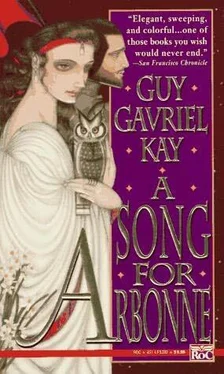Guy Kay - A Song for Arbonne
Здесь есть возможность читать онлайн «Guy Kay - A Song for Arbonne» — ознакомительный отрывок электронной книги совершенно бесплатно, а после прочтения отрывка купить полную версию. В некоторых случаях можно слушать аудио, скачать через торрент в формате fb2 и присутствует краткое содержание. Год выпуска: 1992, Жанр: Фэнтези, на английском языке. Описание произведения, (предисловие) а так же отзывы посетителей доступны на портале библиотеки ЛибКат.
- Название:A Song for Arbonne
- Автор:
- Жанр:
- Год:1992
- ISBN:нет данных
- Рейтинг книги:5 / 5. Голосов: 1
-
Избранное:Добавить в избранное
- Отзывы:
-
Ваша оценка:
- 100
- 1
- 2
- 3
- 4
- 5
A Song for Arbonne: краткое содержание, описание и аннотация
Предлагаем к чтению аннотацию, описание, краткое содержание или предисловие (зависит от того, что написал сам автор книги «A Song for Arbonne»). Если вы не нашли необходимую информацию о книге — напишите в комментариях, мы постараемся отыскать её.
A Song for Arbonne — читать онлайн ознакомительный отрывок
Ниже представлен текст книги, разбитый по страницам. Система сохранения места последней прочитанной страницы, позволяет с удобством читать онлайн бесплатно книгу «A Song for Arbonne», без необходимости каждый раз заново искать на чём Вы остановились. Поставьте закладку, и сможете в любой момент перейти на страницу, на которой закончили чтение.
Интервал:
Закладка:
She doesn't know how she is going to do it, she only knows she will not stay and surrender her child to that man. I am at war now, she thinks, realizing that her only possible advantage is that she knows it and Galbert might not. Inside her, as if in response, the baby kicks hard against her ribs for the first time that morning.
"Hush," she whispers. "Hush, my love. It will not happen. Fear no harm, for none shall find you. Wherever in the world your father is, whether he ever comes to shelter you or no, I will guard you, little one. I swear it upon my life, and yours."
Blaise was thinking of the child as the men of Talair rode north through the cool breezes of autumn in Arbonne: of Aelis de Miraval's son, and Bertran's. Since Ariane had told him the tale that Midsummer night three months ago, he had thought about it more often than he would have expected to, unable not to gaze curiously at such times at the man his own father had paid a quarter of a million in gold to have killed.
A tragedy had unfolded here some twenty-three years ago, and the effects of it were still rippling through Arbonne today. He remembered Ariane's quiet, measured voice telling him the tale as dawn broke over the littered streets and alleys of Tavernel.
"As I told you just now," she had said, "discretion is everything in love. My cousin Aelis had none, though she was very young, and that might be considered an excuse. There was something uncontrolled in her, something too fierce. Hatred and love drove her hard, and she was not a woman to accept her fate, or work within walls built to house her."
"Neither are you," Blaise remembered saying. "What was the difference?"
She had smiled at that, a little sadly, and had not answered for a time.
"The difference, I suppose, is that I saw what she did, and what followed upon it. Aelis is the difference in my own life. She told her husband, you see. She hoarded the truth for a last, bitter swordstroke—with its own slow, killing poison, if you will. When the priestess who had come to her said she was not going to live they brought Urté to her confinement bed. He was sorrowful, I think. I have always thought he was genuinely in sorrow, though perhaps more for the loss of the power she offered him than anything else. Aelis had no softness in her though, she was all pride and recklessness, even on her deathbed. She pushed herself up in the bed and she told Urté the child was Bertran de Talair's."
"How do you know this?"
"I was there," Ariane had said. "As I say, that moment altered my own life, shaped what I think I have become. Those words she spoke to Urté changed our world, you know. We would live in a differently ordered country had Aelis not taken her vengeance."
"Vengeance for what?" Blaise had asked, though he was beginning, slowly, to understand.
"For not being loved," Ariane had said simply. "For being valued at too much less than she was. For being exiled to the dank, grim fastness of Miraval from the lights and laughter of her father's court."
He had thought it might be that. Once he would have scorned such a thing as beneath contempt, another woman's vanity marring the unfolding of the world. It had surprised him a little that he didn't still see it that way; at least that night in Tavernel, with Ariane de Carenzu in his arms he didn't. It had occurred to him then, with a shock he had tried to mask, that this new pattern of thought might be his own deepest rebellion against his father.
"I can guess what you are thinking," Ariane had said.
"No, I don't think you can," he had replied without elaborating. "What did Urté do?" he'd asked, pushing his own family affairs towards the back of his mind. There had been a sadness in Blaise that night, hearing the old tale. The question was a formality. He was sure he knew what En Urté de Miraval had done.
Ariane's answer had surprised him, though. "No one knows for certain. And that is the heart of Bertran's tragedy, Blaise. There was a son born before Aelis died. I watched the priestess bring him into the world. I heard him cry. Then Urté, who had been waiting, took him away, and not Aelis nor the priestess, and certainly not I at thirteen years of age, had the power to stop him within his own walls. I remember how his face changed when she told him who the father was; that I will never forget. And I remember him bending down over her, as she lay there, torn and dying, and whispering something into her ear that I could not hear. Then he left the room with Bertran's child crying in his arms."
"And killed it."
She shook her head. "As I say, no one knows. It is likely, probable, knowing Urté, knowing how such a child would have been heir to so much… to Barbentain, and so to Arbonne itself, as Aelis's child. It is likely, but we do not know. Bertran doesn't know. Not with certainty. If the child lived, if it lives now, only Urté de Miraval knows where it is."
Blaise had seen it clearly then, the harsh, ugly shape of Bertran's pain. "And so Urté could not be killed all these years—cannot be killed now—because any possibility of finding the truth or the child will die with him."
Ariane had looked up at him in the muted grey light of the room and nodded her head in silence. Blaise had tried to imagine what it would have been like to be thirteen years old and to have lived through such a night, to have it lying, like a weight of stones, in your own past.
"I would have killed him regardless," he had said after a long time. And she had answered only, "You and Bertran de Talair are very different men."
Riding north beside the river with Duke Bertran and the corans of Talair to the Autumn Fair in Lussan, Blaise thought again about that remark. It was very nearly the last thing she'd said to him that night before they'd dressed and she'd gone from his room alone, cloaked and hooded, with only a mild, chaste kiss of farewell in first grey light of day.
What made men so different from each other? Accidents of birth, of upbringing, of good fortune or tragedy? What sort of man would Blaise himself have become had he been the older son, the heir to Garsenc, and not the younger one for whom an unwanted destiny among the clergy of the god had been ordained by his father? What if his mother had lived, the question Signe de Barbentain had asked? Would she have made any difference? What if Galbert de Garsenc had somehow been a different, gentler, less power-obsessed man?
Though that last speculation was impossible, really; it was simply not possible to imagine his father as anything other than what he was. Galbert seemed absolute to Blaise, like a force of nature or some gigantic monument of the Ancients, one that spoke to nothing but power and had been in the world almost forever.
Bertran de Talair, too, was a younger son. Only the early death of his brother had brought him to the dukedom and set two great houses so harshly against each other. Before that he had followed the usual course: a sword for hire in battle and tournament, seeking fortune and a place in the world. The same path Blaise de Garsenc was to take, starting from Gorhaut, years after. The same path, that is, if one left out the music.
But the music could not be left out. It defined Bertran, just as it defined Arbonne, Blaise found himself thinking. He shook his head, almost amused at himself. Half a year now he had been here, and already his mind seemed to have this tendency to slide down channels it had never known before. Resolutely he pulled his wandering thoughts back to the present, to the high road of Arbonne built by the Ancients between the river and the grainfields to the east.
Looking ahead, squinting through the dust, Blaise was drawn from reverie. He was riding near the rear of the column, behind the long baggage-train of goods they were escorting to the fair—mostly barrels of Talair wine. He saw Bertran and Valery riding back towards him. Their pace was measured, but just quick enough to make him aware that something was happening at the front of the long column. Beyond the two of them he could make out banners in the distance. They seemed to be about to overtake someone. There was nothing in that, all the roads were crowded on the way to a fair, and the high road most of all. He raised his eyebrows as the two men came up and neatly turned their horses to fall into stride on either side of Blaise.
Читать дальшеИнтервал:
Закладка:
Похожие книги на «A Song for Arbonne»
Представляем Вашему вниманию похожие книги на «A Song for Arbonne» списком для выбора. Мы отобрали схожую по названию и смыслу литературу в надежде предоставить читателям больше вариантов отыскать новые, интересные, ещё непрочитанные произведения.
Обсуждение, отзывы о книге «A Song for Arbonne» и просто собственные мнения читателей. Оставьте ваши комментарии, напишите, что Вы думаете о произведении, его смысле или главных героях. Укажите что конкретно понравилось, а что нет, и почему Вы так считаете.










